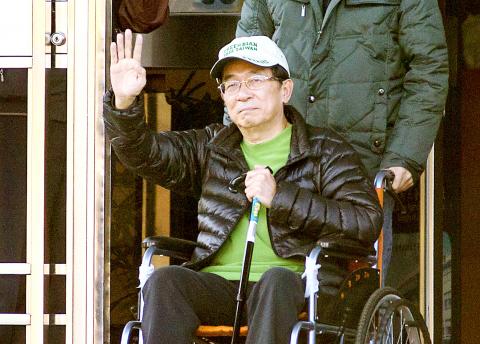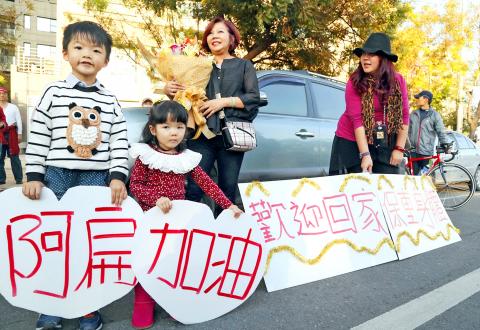Ailing former president Chen Shui-bian (陳水扁) was released from prison on medical parole yesterday, after serving six years for a graft conviction relating to his presidency.
Chen, in a wheelchair and holding a cane, left the prison accompanied by his son, Chen Chih-chung (陳致中), for a month of medical treatment. He waved to a group of supporters waiting outside before boarding a car arranged by prison authorities to take him to his home in Greater Kaohsiung.
As his motorcade — led by police motorcycles — left the prison, some supporters shouted: “A-bian (陳水扁) is not guilty,” and “Go, A-bian,” using the former president’s nickname.

Photo: Reuters
The motorcade navigated throngs of supporters and reporters outside the prison for 10 minutes before breaking free and heading on its way.
Earlier yesterday, a 10-member review panel at the Ministry of Justice’s Agency of Corrections decided to grant the parole in the light of recommendations from a team of doctors who reported a rapid deterioration of Chen Shui-bian’s health since May last year, Deputy Minister of Justice Chen Ming-tang (陳明堂) said.
“His health conditions are complicated and difficult to control. He could die at any time,” Chen Ming-tang said.

Photo: CNA
In a statement, the agency cited the medical team’s report, saying that the 64-year-old is experiencing loss of motor control.
“This type of degeneration occurs in different parts of the brain simultaneously,” it said.
It added that although Chen Shui-bian was being treated by a team of doctors from Taichung Veterans General Hospital, he has not shown any obvious improvement, except for with his sleep apnea.
After careful observation, the medical specialists reported that Chen Shui-bian’s prison environment did not help his health and would lead to worsening illness, the agency said.
The physicians concluded that confinement had seriously affected his health and recommended that he be sent home for care on medical parole, the agency said.
It stressed that the parole is a temporary release on medical grounds and that Chen Shui-bian is required to return to prison once his health stabilizes.
“The parole period will not count toward his prison term,” the agency added.
Taipei Mayor Ko Wen-je (柯文哲), who is also the convener of Chen Shui-bian’s healthcare working group, yesterday called the latter’s release “just the beginning,” given the substantial work ahead in designing a healthcare plan for the veteran politician.
“His going home is not as easy as it looks,” Ko said. “Thought has to be put into his environment and care.”
He gave as an example the need to protect Chen Shui-bian from accidental falls after he gets home.
Ko also expressed support for efforts to curtail the ministry’s power to rule on medical parole cases.
“Chen Shui-bian’s case has shown us that there are no clear rules on the conditions under which prisoners are to be released to receive medical care,” Ko said. “Allowing prison wardens or the Ministry of Justice to unilaterally decide is not ideal, in my opinion.”
Chen Shui-bian was transferred to a prison hospital in April last year after being diagnosed with severe depression, suspected Parkinson’s disease and other conditions.
He attempted to commit suicide in June last year, trying to hang himself with a towel in a prison hospital bathroom, officials said.
Chen Shui-bian’s supporters have recently stepped up their campaign for his early release.
His former deputy, former vice president Annette Lu (呂秀蓮), 70, undertook a three-day hunger strike in a tent late last month to demand that he be freed.
The former Democratic Progressive Party leader ended 50 years of continuous Chinese Nationalist Party (KMT) rule when he came to power in 2000.
After his second term ended in 2008, Chen Shui-bian was sentenced to life in prison in 2009 for money laundering and bribery — a term reduced to 20 years after appeals.
He began serving his sentence on Nov. 11, 2010, but had been detained for nearly two years by then, while prosecutors were investigating and prosecuting the cases.
Chen Shui-bian insists that the charges against him are part of a politically motivated vendetta by the current KMT government in retaliation for his eight years in power promoting Taiwan’s independence.
Additional reporting by Abraham Gerber

Tropical Storm Gaemi strengthened into a typhoon at 2pm yesterday, and could make landfall in Yilan County tomorrow, the Central Weather Administration (CWA) said yesterday. The agency was scheduled to issue a sea warning at 11:30pm yesterday, and could issue a land warning later today. Gaemi was moving north-northwest at 4kph, carrying maximum sustained winds near its center of up to 118.8kph and gusts of 154.8kph. The circumference is forecast to reach eastern Taiwan tomorrow morning, with the center making landfall in Yilan County later that night before departing from the north coast, CWA weather forecaster Kuan Shin-ping (官欣平) said yesterday. Uncertainty remains and

SEA WARNING LIKELY: The storm, named Gaemi, could become a moderate typhoon on Wednesday or Thursday, with the Taipei City Government preparing for flooding A tropical depression east of the Philippines developed into a tropical storm named Gaemi at 2pm yesterday, and was moving toward eastern Taiwan, the Central Weather Administration (CWA) said. Gaemi could begin to affect Taiwan proper on Tuesday, lasting until Friday, and could develop into a moderate typhoon on Wednesday or Thursday, it said. A sea warning for Gaemi could be issued as early as Tuesday morning, it added. Gaemi, the third tropical storm in the Pacific Ocean this typhoon season, is projected to begin moving northwest today, and be closest to Taiwan on Wednesday or Thursday, the agency said. Today, there would likely

DISRUPTIONS: The high-speed rail is to operate as normal, while several airlines either canceled flights or announced early departures or late arrivals Schools and offices in 15 cities and counties are to be closed today due to Typhoon Gaemi, local governments announced last night. The 15 are: Taipei, New Taipei City, Taoyuan, Tainan, Keelung, Hsinchu and Kaohsiung, as well as Yilan, Hualien, Hsinchu, Miaoli, Chiayi, Pingtung, Penghu and Lienchiang counties. People should brace for torrential rainfall brought by the storm, with its center forecast to make landfall on the east coast between tonight and tomorrow morning, the Central Weather Administration (CWA) said. The agency issued a sea warning for the typhoon at 11:30pm on Monday, followed by a land warning at 11:30am yesterday. As of

CASUALTY: A 70-year-old woman was killed by a falling tree in Kaohsiung as the premier warned all government agencies to remain on high alert for the next 24 hours Schools and offices nationwide are to be closed for a second day today as Typhoon Gaemi crosses over the nation, bringing torrential rain and whipping winds. Gaemi was forecast to make landfall late last night. From Tuesday night, its outer band brought substantial rainfall and strong winds to the nation. As of 6:15pm last night, the typhoon’s center was 20km southeast of Hualien County, Central Weather Administration (CWA) data showed. It was moving at 19kph and had a radius of 250km. As of 3pm yesterday, one woman had died, while 58 people were injured, the Central Emergency Operation Center said. The 70-year-old